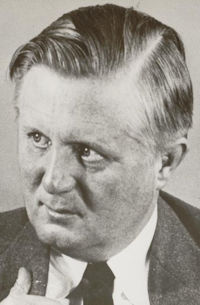Helen Traubel and Melchior in Title Roles at Metropolitan
Atoning for its first, almost catastrophic first performance of the season of “Tristan and Isolde,” the Metropolitan presented Wagner’s music-drama for the second time yesterday afternoon and succeeded in obliterating the effect produced by the preceding presentation.
Only Miss Thebom, the Brangäne, who had been the one saving grace of the previous cast, remained on yesterday’s list of principals. Entirely new in the role of King Marke was Mr. Szekely. Miss Traubel and Mr. Melchior returned in the title roles, both making their first seasonal appearances, and Mr. Berglund offered his first Kurwenal of the year. Mr. Busch, too, conducted for the first time this season, illness having kept him away from his post.
As Isolde Miss Traubel, who has just recovered from a protracted bout with a virus infection, had never delivered the exacting music of her role with such full realization of its ever-shifting emotional facets. Innumerable often haunting subtleties of nuance and tone color illuminated her treatment of the text and much of her vocalism, especially in passages where her fine soprano voice was not utilized full strength, ravishing the ear. Never before has she expressed Isolde’s tenderness so affectingly. Perhaps when she is again in full possession of her vocal resources she will restore the high B’s to the first act narrative and not abandon them altogether as she has the high C’s of the second act or lower ineffectual tones. But even unburnished with gleaming top tones, her singing on this occasion will not soon be forgotten.
Nor has this writer ever heard Mr. Melchior give a more telling account of Tristan’s no less arduous role. The tenor was in exceptionally good form throughout the afternoon and in the taxing third act both his singing and acting were poignantly moving.
Miss Thebom, despite the fact that she had been called upon at short notice – only the night before – to replace Rïse Stevens in the difficult role of Laura in “Gioconda,” revealed no signs of fatigue; indeed she has never poured forth her mezzo-soprano voice in this music with such shimmering opulence nor enacted the part of Isolde’s companion with such assurance and insight.
No finer exponent of King Marke’s music could be imagined than Mr. Szekely, who is the owner of a huge but extraordinary flexible bass voice which enables him to sing softly as effectively as he does loudly and without loss of expressivity. What is more he sings steadily and on pitch, attributes in a Wagnerian bass which one had almost forgotten could exist. On an equally high plane of vocal excellence tarried the Kurvenal of Mr. Berglund which had dramatic cogency as well to recommend it.
To his discourse of the orchestral score Mr. Busch brought out not only the essential incandescent touch in its seethingly climatic pages, but the poetic sensibility and inwardness demanded elsewhere; and even in the most impassioned outbursts he never forgot that even such voluminous voices as those which participated in this memorable performance have their limitations, and that Wagner’s symphonic scoring must be tempered if they are to be heard above it.
Jerome D. Bohm | 4 January 1948




